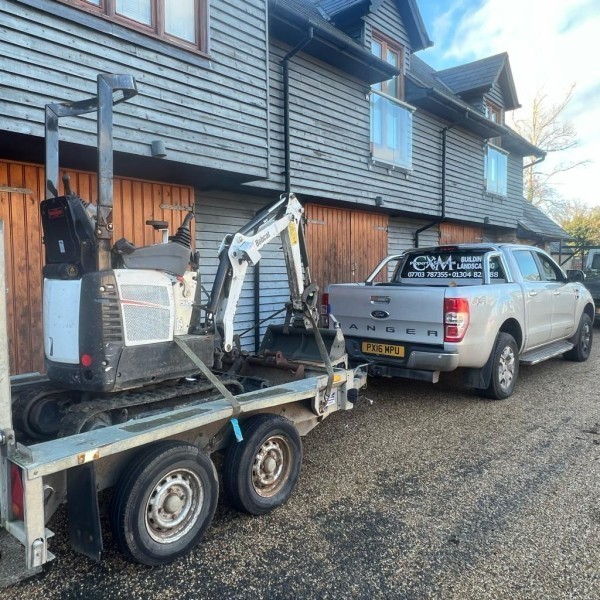Garage Conversions in Dover
RF Property Maintenance & Building Ltd is a premier choice for all your building and maintenance needs in Perry... read more »
Welcome to Inside 'N' Out Contractors, your trusted partner for all your building and renovation needs in Herne Bay and across Kent. As a... read more »
Welcome to Kacey Carpentry, your go-to solution for exceptional carpentry and home improvement services in Bors... read more »
Welcome to Allington Property Services Ltd, your trusted partner for all building and renovation needs in Allington and across Kent. As a... read more »
Welcome to Weatherproof Roofing, your premier choice for roofing services in Beal's Green, proudly serving the entire Kent region. Our te... read more »
Madison Builders: Premier Builders and Renovation Experts in Warmlake, Kent
Welcome to Madison Builders, your tr... read more »
Kent Custom Projects Ltd is a premier choice for all your home renovation needs in Blean and throughout... read more »
M&W Carpentry And Frames LTD is a premier tradespeople business located in the vibrant town of Chatham,... read more »
Welcome to SP Bespoke Ltd, your premier choice for expert carpentry and renovation services in Stone Hill and through... read more »
Welcome to JKR Landscapes, your premier choice for builders and landscaping contractors in Pullington and throughout Kent. Our Pullington... read more »
Welcome to Teasdale Construction Ltd, your go-to experts for all construction needs in Charcott and across Kent. As a leading name in the... read more »
Wisdom Building Services Ltd is your go-to solution for all construction needs in |LOCATION| and the su... read more »
Welcome to Bronzewood Lofts LTD, your go-to experts for builders, loft conversions, extension builders, and garage conversions in The War... read more »
Welcome to C.M Property Services, your trusted partner for all building and landscaping needs in Buckland... read more »
Welcome to GT Landscapes, your trusted partner for exceptional landscaping services in West Kingsdown and across the pic... read more »
Welcome to IV Construction, your premier choice for expert tradespeople services in Wrotham Heath and throughout Kent. Specialising in ba... read more »
Welcome to Paros Plastering, your trusted plasterers... read more »
Welcome to Lee Construction, your trusted partner for... read more »
Welcome to SMC Construction Kent Ltd, your trusted pa... read more »
Search Garage Conversions in places nearby
- Garage Conversions in Ashford
- Garage Conversions in Broadstairs
- Garage Conversions in Canterbury
- Garage Conversions in Chatham
- Garage Conversions in Deal
- Garage Conversions in Faversham
- Garage Conversions in Folkestone
- Garage Conversions in Gillingham
- Garage Conversions in Gravesend
- Garage Conversions in Herne Bay
- Garage Conversions in Hythe
- Garage Conversions in Lydd
- Garage Conversions in Maidstone
- Garage Conversions in Margate
- Garage Conversions in New Romney
- Garage Conversions in Northfleet
- Garage Conversions in Ramsgate
- Garage Conversions in Rochester
- Garage Conversions in Royal Tunbridge Wells
- Garage Conversions in Sandwich
Understanding Garage Conversions in Dover
Garage conversions in Dover have become increasingly popular as homeowners seek to maximise their living space without the hassle of moving. This trend is not just about adding square footage; it's about transforming underutilised areas into functional, beautiful spaces. Whether you're considering a new home office, a guest room, or a play area for the kids, converting your garage can be a cost-effective and rewarding project.
The Benefits of Garage Conversions
Garage conversions offer a myriad of benefits. Firstly, they can significantly increase the value of your home. By converting a garage into a liveable space, you can add up to 20% to your property's value. Secondly, it's a more affordable option compared to building an extension. You already have the structure in place, which means less construction work and lower costs.
Increased Living Space
One of the most obvious benefits is the additional living space. Whether you need an extra bedroom, a home gym, or a studio, a garage conversion can provide the space you need without encroaching on your garden or outdoor areas.
Enhanced Property Value
As mentioned earlier, a well-executed garage conversion can boost your property's market value. This is particularly beneficial if you plan to sell your home in the future. Potential buyers often see the added space as a significant advantage.
Cost-Effective Solution
Compared to other home improvement projects, garage conversions are relatively inexpensive. You save on costs related to foundation work, roofing, and external walls, as these are already in place.
Planning Your Garage Conversion
Before diving into a garage conversion project, careful planning is essential. This involves understanding local regulations, setting a budget, and deciding on the design and function of the new space.
Understanding Local Regulations
In Dover, like many other places, you need to be aware of local building regulations and planning permissions. While some garage conversions may not require planning permission, it's crucial to check with the local council to ensure compliance with all regulations.
Setting a Budget
Establishing a budget is a critical step. Consider costs for insulation, flooring, windows, and any structural changes. It's also wise to set aside a contingency fund for unexpected expenses.
Design and Functionality
Think about how you want to use the space. Will it be a cosy guest room, a vibrant playroom, or a sleek home office? The design should reflect the intended use, ensuring that the space is both functional and aesthetically pleasing.
Steps to Convert Your Garage
Converting a garage involves several steps, from initial planning to final touches. Here's a comprehensive guide to help you navigate the process.
Initial Assessment
Start by assessing the current state of your garage. Check for any structural issues, such as cracks or dampness, that need addressing before conversion begins.
Insulation and Ventilation
Proper insulation is crucial for comfort and energy efficiency. Consider insulating the walls, ceiling, and floor. Additionally, ensure adequate ventilation to prevent moisture build-up and maintain air quality.
Electrical and Plumbing Considerations
If your conversion includes a bathroom or kitchen area, you'll need to plan for plumbing. Similarly, consider the electrical needs of the new space, such as lighting, heating, and outlets.
Flooring and Walls
Choose flooring that suits the intended use of the space. Options include carpet, laminate, or tiles. For the walls, consider drywall or plasterboard for a smooth finish.
Windows and Doors
Adding windows can enhance natural light and ventilation. If privacy is a concern, consider frosted glass or blinds. The garage door can be replaced with a standard door or a windowed wall for a more residential look.
Common Challenges and Solutions
While garage conversions are generally straightforward, they can present some challenges. Being prepared can help you overcome these hurdles effectively.
Dealing with Dampness
Garages are often prone to dampness. Address this issue by installing a damp-proof membrane and ensuring proper ventilation.
Managing Space Constraints
Garages can be narrow or oddly shaped. Creative design solutions, such as built-in storage or multi-functional furniture, can help maximise the available space.
Ensuring Adequate Lighting
Garages typically have limited natural light. Incorporate a mix of ambient, task, and accent lighting to create a bright and welcoming environment.
Case Studies: Successful Garage Conversions in Dover
Looking at successful garage conversions can provide inspiration and insights for your project. Here are a few examples from Dover that showcase the potential of these transformations.
The Home Office Haven
One Dover homeowner transformed their garage into a serene home office. By incorporating large windows, a skylight, and minimalist decor, they created a bright and productive workspace.
The Cosy Guest Suite
Another family converted their garage into a cosy guest suite, complete with an en-suite bathroom. The use of warm colours and soft furnishings made it a welcoming retreat for visitors.
The Creative Studio
A local artist turned their garage into a vibrant studio. With ample storage for supplies and a large worktable, the space became a hub of creativity and inspiration.
Frequently Asked Questions
Do I need planning permission for a garage conversion in Dover?
In many cases, planning permission is not required for a garage conversion. However, it's essential to check with the local council to ensure compliance with all regulations.
How much does a garage conversion typically cost?
The cost of a garage conversion can vary depending on the size and complexity of the project. On average, you might expect to spend between £5,000 and £15,000.
How long does a garage conversion take?
The duration of a garage conversion can vary, but most projects are completed within four to six weeks, depending on the scope of work.
Can I convert a detached garage?
Yes, detached garages can be converted. However, additional considerations, such as connecting utilities, may be required.
Will a garage conversion affect my home insurance?
It's advisable to inform your insurance provider of any significant changes to your property, including a garage conversion, to ensure your coverage remains valid.
Can I convert part of my garage and keep the rest for storage?
Yes, partial conversions are possible. You can design the space to retain some storage while converting the rest into a functional area.
Final Thoughts on Garage Conversions in Dover
Garage conversions in Dover offer a fantastic opportunity to enhance your living space and increase your property's value. With careful planning and execution, you can transform an underutilised area into a functional and beautiful part of your home. Whether you're looking to create a home office, guest suite, or creative studio, the possibilities are endless. Embrace the potential of your garage and unlock the additional space your home deserves.





















